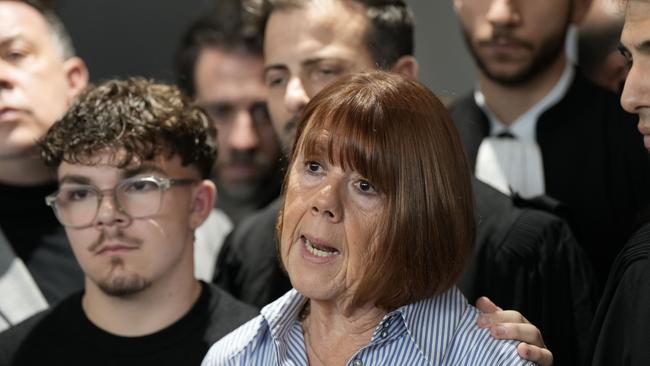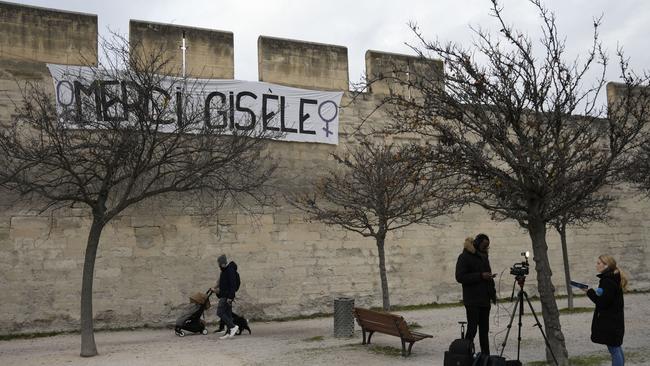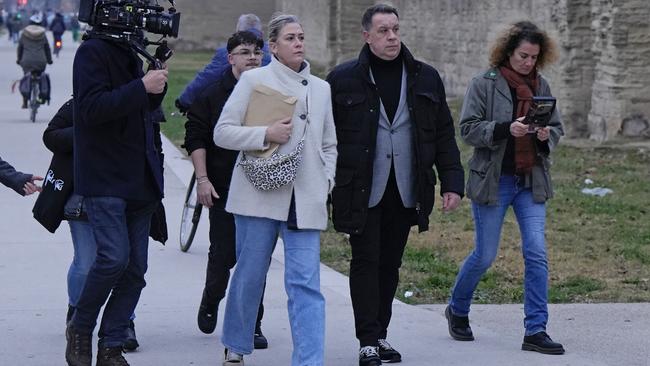Pelicot case opens nation’s eyes to ‘rape culture’
The Pelicot trial will “fundamentally change relations between men and women” in France, its chief prosecutor said on Thursday.

The Pelicot trial will “fundamentally change relations between men and women” in France, its chief prosecutor said on Thursday.
The ordeal of Gisele Pelicot has woken the country to “the rape culture” that pervades society, Jean-Francois Mayet added in his closing speech to the court.
More than three months of gruesome reports from the Avignon trial have forced France to reflect on how dozens of men, mostly working- and lower-middle-class residents from around the town of Mazan, raped one woman undetected for more than a decade at the invitation of her husband.
Dominique Pelicot, 72, was sentenced to 20 years in jail for drugging his then wife unconscious; raping her and inviting dozens of men to abuse her. Of the other men, 48 were also convicted of rape, one of attempted rape and one of sexual assault. They received prison sentences ranging from three to 15 years.
Ms Pelicot’s insistence on an open trial, with the media and public viewing the videos of her rapes, helped to demonstrate France’s enduring subordination of women and tolerance of sexual violence, according to government ministers, commentators and campaigners.
“Gisele Pelicot has enabled French society to advance, to see what conjugal rape and ‘chemical submission’ is about, and to show that rape involves Mr and Mrs Average,” said Anne-Cecile Mailfert, chairwoman of The Women’s Foundation.
Activists and celebrities have signed petitions and open letters calling for a revolution and an end to denial. “No one can look away any longer from the horror of sexual violence and its terrifying ordinariness,” a coalition of 50 organisations, including feminists and trade unions, said in October.

Commentators of both sexes have joined the chorus demanding a male awakening. “Yes, all men are guilty. They are guilty of remaining indifferent,” philosopher Camille Froidevaux-Metterie wrote. “Very few men have tried to understand what this is about. They can thus say they are not ashamed since they remain ignorant of this historic reality.”
There has been some pushback against the idea of rape culture and toxic behaviour exhibited by men. The backlash has been voiced under the English-language hashtag #notallmen.
On the feminist side, however, the marathon trial reinforced the argument that decades of progress on women’s rights have not erased the residue of a millennia of misogyny. As essayist Noemie Renard wrote: “The Mazan rape trial shows how much sexual violence remains embedded in our society.” The prosecutor’s words showed how the once radical concept of “rape culture”, which emerged in 1970s America, has gone mainstream.
“Patriarchal power” survives, encouraging sexual violence while denying its existence and intimidating women with the concept of shame, say the French campaigners. The phenomenon has been fuelled by the explosion of internet pornography that has increased a sense of male entitlement to sex, three writers said in Liberation newspaper this week.

Seventy per cent of rape and attempted rape in France is committed by people close to the victim, mostly without violence, according to studies. Interior Ministry figures show only 6 per cent of victims of sexual violence went to the police in 2022, and only 30 per cent of reported sexual violence reaches the courts.
The stumbling explanations from Ms Pelicot’s abusers have exposed archaic notions of consent and conjugal rights that have defied the era of equality. One by one, the accused argued that they believed Ms Pelicot, though inert, was complicit in a sex game staged by her husband with her consent. His assurances, made in their online exchanges, were sufficient to convince them to come to the Pelicot bedroom, several told the court.
Christian L’Ecole, a 56-year-old fire officer, said he and the others accused of rape had been fooled because Dominique Pelicot had broken the code of “libertine” games, in which couples invite men or couples over for a sexual encounter. “You only talk to the man. He ensures the safety of his wife,” L’Ecole said. Like most of the accused, he said he was not aware at the time of committing rape. “It was maybe like involuntary rape,” he said.
A movement that was under way before the trial, supported by President Emmanuel Macron and left-wing and centrist MPs, is seeking to change the rape law to include the notion of consent. At present the crime is defined as a sex act committed “by violence, coercion, threat or surprise”.
Campaigners are dismayed over what they see as the failure of the political world to take the Pelicot case sufficiently seriously, despite its intense media coverage. Marie-Charlotte Garin, a 31-year-old Greens party MP from Normandy, said the political classes were dominated by men “who have not examined their consciences”.
Many lament what they see as France’s failure to match the MeToo awakening that came seven years ago from the US. While some actors and directors, including Gerard Depardieu, are now the target of rape investigations, there has been a backlash.
Catherine Deneuve and other screen stars argued that men must be allowed to flirt and “importune” women as part of the ancestral play between the sexes. Feminists were also angered by Mr Macron’s support last year for Depardieu, despite rape charges and abuse allegations against him from 20 women.
Some argue that Pelicot and his co-accused were not “Mr Everyman” but social deviants, some with criminal records, drawn by an exceptionally perverse “master of ceremonies”.
Stephane Babonneau, Ms Pelicot’s lawyer, argued that the accused were not average men. They shared common profiles of family turmoil and a quarter of them were sexually abused as boys. Their psychiatric reports showed egotistic personalities and a lack of empathy, he pointed out.
Defending men in general, Laurence de Charette, deputy editor of the conservative Figaro newspaper, said it was absurd to see the case not as the trial of 51 men but of “male domination”. “The feminists are fighting the wrong battle and solving nothing when they blame ‘the rape culture’ rather than the guilty men,” she wrote.
The Times



To join the conversation, please log in. Don't have an account? Register
Join the conversation, you are commenting as Logout